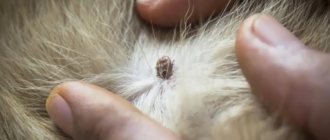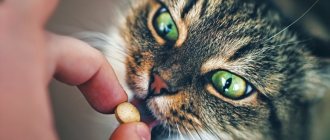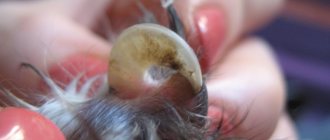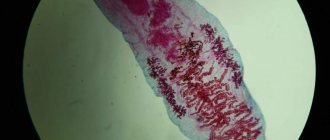How to treat worms in a pregnant cat?
It is impossible to identify worms in a pregnant cat on your own, because...
multiple symptoms of helminthiasis can easily be mistaken for vitamin deficiency, chronic intoxication or allergies. It is not recommended to treat helminthic infestations at home without consulting a specialist. In the 1st trimester of pregnancy, the formation of the kittens’ nervous system occurs, and the use of various medications by the animal can cause irreparable harm.
If you suspect a disease, it is recommended to contact a veterinarian who will conduct a professional examination of your pet, after which the following diagnostic tests will be prescribed:
- stool and urine analysis;
- clinical blood test;
- blood chemistry.
Only in a veterinary clinic can an accurate diagnosis be made and an effective treatment prescribed. If the parasites identified by the doctor do not pose any threat to the health of the mother cat and her kittens, measures to eliminate them can be postponed until the birth of the offspring. If laboratory tests show that the cat is infected with helminths, the larvae of which are able to penetrate the placental barrier, treatment cannot be avoided in the 2nd trimester.
A post shared by Veterinary Clinic GAU SZ (@vetgausz) on Dec 18, 2020 at 7:34pm PST
Treatment should be started if the following symptoms are present:
- lack of appetite;
- lethargy;
- dull coat;
- presence of helminths in feces.
If your four-legged friend feels good, behaves cheerfully and actively, there is no need to take risks, because... the use of certain drugs can result in premature birth or the development of pathologies in kittens.
Pumpkin
Pumpkin seeds are a well-known remedy for expelling parasitic worms, which has been used in folk medicine for a very, very long time. They performed no worse in veterinary medicine. Give your cat about a handful of pumpkin seeds a day. Naturally, well shelled and thoroughly crushed. Since the product has a fairly neutral taste and smell, there are no problems with this. It is enough just to mix the crushed seeds with minced meat or sausage.
In addition to expelling worms, this remedy has other positive effects. In particular, the composition of the seeds is very rich in microelements and vitamins, which will definitely not be superfluous for a nursing cat (and her offspring). You can not only treat a nursing cat for worms, but also improve the general condition of both the mother and her offspring. This simple drug has no contraindications; nothing is known about cases of food intolerance or allergies to this day.
As an example, we gave two reliable and well-proven folk remedies that (if used wisely) will not cause any harm to your pet’s health. But on the Internet you can find many recipes for herbal decoctions and mixtures that will also (theoretically) save a nursing pet from helminths. But we wouldn't recommend using them. It is difficult to say how the cat’s body will behave when taking them. It is likely that as a result she will develop a severe allergy, or even anaphylactic shock. So no need to take risks!
How to properly give anthelmintic to a dog
Deworming before vaccination is carried out 10–14 days before vaccination. If this procedure is performed for the first time for a puppy, it is better to consult a veterinarian, since only a professional can accurately recommend tablets and calculate the required dosage. If the drug or dosage is chosen incorrectly, the puppy may experience complications.
- 40 minutes after administering the medicine, you can give the puppy Vaseline oil to drink for better absorption of the anthelmintic; take 3 ml of oil per 1 kg of animal weight. Vaseline oil improves the effect of the anthelmintic drug, protects the puppy’s intestines from dysbacteriosis and complete intoxication.
- If a puppy has traces of worms in his feces, then the infection has already gone far, and it is unknown how many of them are in the body. It is necessary to take tests to identify the type of helminths, on the basis of which treatment will be prescribed.
- If an animal cannot drink medicine on an empty stomach, then anthelmintics can be given 3 hours before meals or 2 hours after feeding.
- To make deworming more comfortable, before and after it, the dog should be given medications that support the liver and kidneys. It is these organs that bear the brunt of the toxins caused by dying helminths. Only a veterinarian can tell you what type of product to give to an animal, but most often they use hepaprotectors, for example, Karsil; you can give sorbents, for example, Enterosgel.
- If it is known that the animal is infected with helminths, and their traces are noticeable in the feces, then before the vaccine is administered, the dog must be dewormed twice, maintaining an interval of 14 days. It is important to vaccinate every 10 days.
The vaccination should not be given to an organism weakened by helminths, since the administration of the vaccine is stressful for the animal, and it is not known how the drug will affect the pet’s condition.
We suggest you read Why the cat became lethargic and apathetic: what to do about it
The following symptoms will help you understand that your pet has worms:
If your dog has diarrhea after taking an anthelmintic, you should contact your veterinarian, because this may be a sign of intoxication. In this case, you cannot carry out treatment yourself, otherwise you can only worsen the situation.
Due to the fact that recently there have been a lot of questions in the comments about how to properly deworm cats and kittens, I decided to write a separate post where every owner of a British cat can find answers to all their questions. So, according to the standard scheme, you need to give your cat leaf medications once every 3 months.
If you find fleas on your British cat, deal with them first, and only after 10-14 days give deworming medication. Stronghold, Frontline, and Advantage drops on the withers have proven themselves to be effective. By the way, we use the latter ourselves; the dosage is calculated based on the weight of the animal, and is applied only once.
Only healthy cats can be given anthelmintic drugs! If you notice that something is wrong with your kitten or cat, it is better to put off the deworming!
Please note that drugs such as Prazitel and Prazicide are not 100% effective, and very often on the Internet you can find information about frequent counterfeits, and that cats often began to be poisoned by these drugs, and there were even deaths! This also applies to the drug Drontal. Do not use anthelmintics intended for humans!
If the cat eats natural products, then worms should be removed every 3 months. Here is a list of drugs that have worked well:
— deworming drops for cats on the withers Profender (can be used for kittens from 5 weeks)
— Kanikvatel (suitable for kittens from 3 weeks)
— Troncilom K
— Febtal (for cats and dogs from 3 weeks)
— Milbemax (kittens no earlier than 6 weeks of age)
Dosages of anthelmintic drugs are calculated based on the weight of the animal, take this into account when you buy them. Also read the instructions carefully, because anthelmintic drugs themselves are poison.
ATTENTION: PROFENDER is dripped onto the withers ONCE WITHOUT REPEATING, the drug is effective for 28 days! Carefully read the instructions for the medications!
Along with anthelmintic drugs, it would not be superfluous for the cat to give an injection of Gamavit - 0.5 - 3 ml or (in case of severe anthelminticism) Fosprenil 0.5 ml. These drugs are injected subcutaneously, either into the fold of the withers or intramuscularly (into the hind leg).
Additionally, after anthelmintic drugs, it is imperative to give the cat or kitten one of the sorbents: enterosgel (not sweet!) - a teaspoon of a solution diluted according to the instructions (half a teaspoon for kittens), polysorb, or enterodes according to the instructions, give by weight as for infants, or activated carbon - 1-1.5 tablets for an average cat, half for a kitten.
After all the manipulations, make sure that in the next 24 hours the cat goes to the toilet a lot (so as not to get poisoned!!!). If there are problems with stool, you can give 6-8 ml (for kittens 1-3 ml) of Lactusan or Duphalac (laxative syrup, sold in regular pharmacies.) Or the same amount of Vaseline oil. No other oil except Vaseline can be used! All other oils will damage the animal's liver!
For preventive purposes - once every 3 months, anthelmintics without repetition - once.
We invite you to familiarize yourself with the Description and maintenance of Cane Corso dogs at home
It is imperative to drive away worms before vaccination according to the following scheme:
1 - for cats that have never been dewormed, or that are dewormed once every six months / year, if this is not a drug that is given once (for example Profender) and so on - twice according to the scheme above, 5-10 days after the second run - graft.
2 - for cats that are dewormed once every 3 months - a one-time deworming (repetition is not required) and vaccination after 5-10 days.
Basic information
The first question that owners of a sick but nursing cat ask themselves is “How high is the likelihood of kittens becoming infected”? Unfortunately, it is not just high, but close to 100%. Why does this happen? The thing is that sexually mature helminths can produce hundreds and even thousands of eggs in just one day. The likelihood that at least a dozen or two will end up on the mother’s nipples is phenomenally high. But that’s not all!
Consider, for example, the life cycle of parasitic nematodes (roundworms). Their larvae, hatching from eggs in the animal’s intestines, pierce the walls of the organ and, together with the blood flow, travel to the lungs. But this is in theory. In practice, a significant part of them (up to 15-21%, according to various researchers) is encapsulated in the mammary glands of females. When the organs begin to secrete milk, the worms are “re-preserved.” They enter directly into the milk ducts, and from there into the kittens’ digestive system. Since the immune system of the latter is in its infancy (antibodies supplied with milk only help pathogens of infectious pathologies), the probability of infection is 100%.
There are other reasons why kittens immediately get sick. Intrauterine route of infection. The larvae of some parasites (usually the same nematodes) easily overcome the placental barrier during migration, after which they are introduced into the body of unborn kittens. The intensity of the infestation is further increased due to the ingestion of new portions of larvae, which, as we remember, may well end up in cat’s milk. Please note that parasitic diseases in kittens are very severe.
While an adult and physically strong animal may not have any clinical signs at all, in children the symptoms are extremely pronounced. In particular, with toxocariasis, the kitten’s belly literally swells, which contrasts sharply with the ribs protruding from under the skin.
When deworming a pregnant cat is a necessity
Pregnant cats should be treated for worms if the presence of parasites prevents the cat from living and raising future offspring. The following dangerous signs of infection are identified:
- no appetite;
- noticeable deterioration in the animal’s condition;
- the presence of helminths can be traced in the feces.
If your pet looks cheerful and healthy and eats well, then it is better to hold off on taking anthelmintics. Taking the drugs can cause miscarriage, and if kittens are born, they may have congenital deformities.
But even though antiparasitic drugs are dangerous, if the animal has a lot of helminths, you shouldn’t think about whether it’s possible to deworm a pregnant cat. For a cat, and even more so for kittens, such a manifestation of the disease is unacceptable.
Although the last third of pregnancy is a time during which even a very infected cat should not be treated. During this period, the poison from the medicine and dead parasites will have the most detrimental effect on the fetus.
As has already been said, anything can happen, and an animal can get sick while pregnant. But these are rare cases, and if, for preventive purposes, periodic deworming and deworming of the cat before mating are carried out, then this problem will most likely be avoided.
Important tip! If you have a purebred cat and are looking for a suitable cat to breed with, be sure to make sure that the partner you choose is also parasite-free.
Garlic
So what to do in the case when the probability of infection of kittens is very high, but they have not yet reached a “serious” age? How to remove worms from a nursing cat? There is only one thing left - to use the means and methods of “folk veterinary medicine”. And ordinary garlic deservedly holds the “palm” here . It is believed that just one clove of chopped garlic per week is a reliable way to rid a nursing cat of worms. There is, however, one problem. Since this plant contains many odorous aromatic substances, kittens may not like the change in the taste of mother's milk, so they will begin to eat worse. But this doesn’t happen often, and hunger eventually takes its toll.
Is it possible to worm a nursing cat with kittens?
2 months have passed since lambing. Even kittens can already be dewormed for prevention; at the same time, prepare them for the upcoming vaccination against infectious diseases.
A couple of days ago, on the steps of a store in the cold wind, a street cat began to give birth. They brought her home. She gave birth to three kittens. Only two days have passed, the kittens are alive, she feeds them.
Today I saw a worm crawl out of her anus and crawl somewhere about its business, the little bastard.
- Is it possible for Russian citizens to have military weapons?
Is it possible to give the cat some kind of drug, maybe an incomplete dosage, to weaken the worms? The cat herself has loose stools and gases.
Is it possible to give anti-worm medications to pregnant and lactating animals?
It is not recommended to deworm pregnant and lactating animals, since most antiparasitic drugs can have a negative effect on the development of the young.
Prevention of worms in females should be carried out 10-12 days before the expected mating/mating. Cubs are wormed 21 days (3 weeks) after birth.
If a pregnant animal has become infected with worms, then the issue of deworming it must be discussed with a veterinarian and the degree of possible risk must be assessed.
How dangerous are antihelminthic drugs?
There are different opinions on this matter. Most manufacturers of anthelmintic drugs believe that they should not be given to lactating or pregnant animals, or should be done only in extreme cases, when helminthic infestation can lead to the death of the mother and her offspring. Veterinarians provide the following information:
- Prasicide can be used on animals that are at least a couple of weeks old.
- Drontal. It is already recommended to give it only to those kittens who are at least three weeks old.
- Dirofen. It is available in the form of a special “kitten” paste, but even this can only be used from three weeks of age.
- Profender. These tablets are strictly for animals at least eight weeks old! Otherwise, the development of liver and kidney damage is very likely.
- The popular “Lawyer” – only from nine weeks.
- Again, Bars Spot, supposedly designed specifically for kittens, has a maximum limit of three months. Giving it earlier is strongly not recommended! It is fraught with serious consequences for the kidneys and other organs of the excretory system.
As you can guess, lactating cats do not need to be given all these medications at all. Especially in cases where the nursing kittens are not yet a week old. In such cases, you will have to wait at least until they reach two weeks of age , since the potential harm from the drugs may exceed that caused by the parasites. Of course, at this time the animals must be under the supervision of a veterinarian.
Is it possible to give antihelminthic tablets?
So is it possible to give pills to pregnant bitches? It depends entirely on the specific drug. Until relatively recently, breeders of sick pets were in a very difficult position: on the one hand, the animal needed to be treated, on the other, all existing medications gave too severe side effects.
We suggest you read: How to wash a cat's greasy tail? A cat's greasy tail: treatment with folk remedies
Fortunately, today the situation in the pharmaceutical market has changed dramatically: now manufacturers are producing drugs that can hypothetically be given to pregnant dogs. True, there is almost always a caveat: you can give it, but it is very advisable to wait at least two weeks (from the beginning of pregnancy).
The following drugs have the mildest effect:
As for the last remedy: despite the “Junior” in its name, the medicine is well suited not only for young animals, but also for pregnant dogs. The reason is the softness of its action. Since we have to treat an animal in a special situation, whose body is very sensitive to any toxins and other negative influences, this precaution will definitely not be superfluous.
Important Note
So you have learned what to do when a nursing pet has worms. But the drugs we described have one drawback - they only stun parasites, but do not kill them (not all, at least). Simply put, there is a need to urgently remove stunned worms from the animal’s body. This can only be done by giving your pet laxatives in a timely manner.
Question for experts: I gave birth on October 29th. Kittens suck milk. Is it possible to treat their mother and with what?
Sincerely, Elena
Contraindications
Contraindications to taking the veterinary drug Prazicide relate to individual intolerance to the components of the drug. It is not recommended to give medicine to weakened animals that have suffered serious illnesses, injuries, or surgeries. Deworming is carried out a month before or after childbirth.
The drug is contraindicated in the following cases:
- cubs up to 3 weeks;
- the last stages of pregnancy in females;
- feeding period;
- infections and viruses;
- allergic reaction.
Prevention measures
To prevent your cat from being affected by helminths, the following preventive measures should be taken:
- Use antihelminthic drugs 2 weeks before the planned mating.
- Avoid contact with infected animals.
- Feed your pet quality food. It is unacceptable to eat fresh food. All food is stored in the refrigerator. Leftover food not eaten by the pet is thrown away. It is prohibited to feed river fish that has not undergone heat treatment.
- Shoes that owners wear outside should be stored in closed cabinets to prevent worm eggs from getting onto the floor. This requirement must be followed when the cat is pregnant and immediately after giving birth.
- Clean your cat's litter box regularly. Ensure that basic hygiene rules are observed.
Tablets and suspensions
Lovers of furry four-legged friends often wonder what to do if a pregnant cat has worms, and how to deal with them so as not to cause harm. There are many remedies, and among them a special place is occupied by tablets, which have great advantages due to the following nuances:
- are produced based on weight, so it is not difficult to determine the dosage of the drug;
- the medicine can be mixed with food or water;
- many products are produced with the taste of meat and fish;
- No special conditions are required for storing tablets.
Before using the drug in tablet form, you must weigh your pet to determine the exact dosage. An overdose can cause side effects in an animal such as:
- vomit;
- diarrhea;
- bloody feces;
- apathy;
- copious secretion of saliva.
To get rid of worms, you can give your pets the following tablets:
The suspension is always equipped with a dispenser. In the absence of this, the suspension can be given to the cat using a syringe. The required amount of suspension is drawn into a dispenser or syringe. The animal needs to be placed on your knees, calmed, open its mouth and pour the product onto the root of the tongue. If this fails, the drug should be mixed with food.
There are several types of anti-worm suspensions:
Types of worms
The following types of worms parasitize cats. Each type has its own symptoms and routes of infection.
Tapeworms (cestodes)
Long and flatworms can reach a length of up to 70 cm. The body of these worms consists of many segments, in each of which larvae mature.
When the larvae mature, they separate and come out together with the feces, while the segmented body of the parasite grows continuously, and new segments with larvae appear to replace the separated segments.
Routes of infection
Cats become infected with this type of worms by eating raw meat and fish. Stray animals often become infected with cestodes by eating rats or mice. Infection through larval carriers, fleas, is also possible. Helminths parasitize the walls of the cat's small intestine.
Signs of tapeworm infestation:
- changes in the pet’s body weight (the weight either increases sharply, or the cat, on the contrary, rapidly loses weight);
- change in appetite (the cat is insatiable or, on the contrary, refuses food);
- large, “inflated” belly;
- hair loss;
- Excessive licking in the anal area.
Why are they dangerous?
The cat's gastrointestinal tract becomes clogged with worms, causing intestinal obstruction. Possible death.
As you can see
It is very common to see tapeworm segments around the anus of a sick animal - these segments resemble grains of rice or sesame. Also, individual parts of cestodes are found on the animal’s bedding. In a more severe form of worm infestation, parasites can be seen in the vomit.
Roundworms (nematodes)
The most common type of internal parasites that infect cats. There are many varieties, but the most common in our pets are roundworms. In appearance, the parasites resemble spaghetti, which is where the name “round” comes from. The length of roundworms usually reaches 5 cm, but longer individuals are also found.
Routes of infection
Kittens can become infected with roundworms through their mother's milk. The danger of infection lies in wait for an adult cat when eating rodents, raw meat and in contact with an infected animal.
Signs of roundworm infection:
- weight loss;
- enlarged belly;
- vomit;
- diarrhea;
- general weakness.
Why are they dangerous?
Worms accumulate in the small intestine, injure the gastric mucosa, and can clog the bile ducts and intestines. They can parasitize almost all organs of the animal, having a strong toxic and allergic effect on the body.
As you can see
With intense helminthic infestation, nematodes can be seen in sputum after coughing or in vomit. Roundworm eggs can accumulate in the folds around the animal's anus.
Flukes (trematodes)
Parasites that can be localized anywhere: in the gastrointestinal tract, liver, bile ducts, respiratory organs. These are flatworms with suckers, with which they are firmly attached to the tissues of internal organs, most often the liver. With these suckers, hermaphrodite worms attach to the tissues of the cat's internal organs, eating and destroying them.
Routes of infection
Infection occurs by eating raw fish, seafood or through raw water.
Symptoms of fluke infection:
- cough;
- dyspnea;
- jaundice;
- vomit;
- weight loss;
- diarrhea;
- painful stomach;
- depressed state.
Why are they dangerous?
The activity of parasites disrupts the patency of the bile ducts, causing cirrhosis and liver failure. This can cause lethargy and death.
As you can see
The moving parts of the flukes can come out through the cat's anus. If you look closely, you can see tiny translucent parts of the parasite around the animal's anus, on its bedding.











